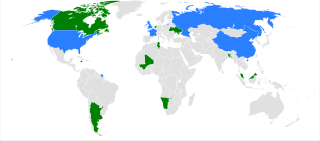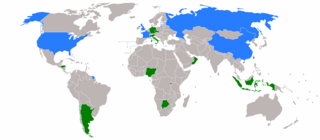A Special Session of the United Nations General Assembly, or UNGASS, occurs when the United Nations General Assembly meets in order to discuss an important wide-ranging topic.
Under Chapter IV, article 20 of the United Nations Charter, "Special sessions shall be convoked by the Secretary-General at the request of the Security Council or of a majority of the Members of the United Nations." The request of the Security Council requires a vote of nine or more of its fifteen members. However, since 1975, all special sessions have been called by the General Assembly. [1] [2]
Each special session deals exclusively with one topic with a short agenda. They are typically high-level events with the participation of heads of state and government and government ministers. A special session usually adopts one or two outcome documents, such as a political declaration, action plan or a strategy. Special sessions last from one to several days. Like a regular annual session, a special session consists of both formal and informal plenary meetings, with a Committee of the Whole negotiating the outcome document. [1]
The procedure to call a special session are laid out in the Rules of Procedure of the General Assembly. The rules pertaining to special sessions are as follow: [3]

The United Nations General Assembly is one of the six principal organs of the United Nations (UN), serving as its main deliberative, policymaking, and representative organ. Currently in its 78th session, its powers, composition, functions, and procedures are set out in Chapter IV of the United Nations Charter.

The United Nations Trusteeship Council is one of the six principal organs of the United Nations, established to help ensure that trust territories were administered in the best interests of their inhabitants and of international peace and security.

The member states of the United Nations comprise 193 sovereign states. The United Nations (UN) is the world's largest intergovernmental organization. All members have equal representation in the UN General Assembly.
"China" is one of the members of the United Nations and is one of five permanent members of its Security Council.

The National Assembly is the unicameral legislature of Serbia. The assembly is composed of 250 deputies who are proportionally elected to four-year terms by secret ballot. The assembly elects a president (speaker) who presides over the sessions.

The tenth emergency special session of the United Nations General Assembly centers on the Israeli–Palestinian conflict: the ongoing occupation of the West Bank and the Gaza Strip. The session was first convened in 1997 under the president of the General Assembly, Razali Ismail of Malaysia. This occurred when the Security Council failed to make a decision on the issue at two different meetings. The session is currently ongoing as of October 26, 2023.
An Emergency Special Session of the United Nations General Assembly is an unscheduled meeting of the United Nations General Assembly to make urgent recommendations on a particular issue. Such recommendations can include collective measures and can include the use of armed force when necessary to maintain or restore international peace and security in the case of a breach of the peace or act of aggression when the United Nations Security Council fails to exercise its responsibility for the maintenance of international peace and security due to lack of unanimity of its permanent ("veto") members.

The International Law Commission (ILC) is a body of experts responsible for helping develop and codify international law. It is composed of 34 individuals recognized for their expertise and qualifications in international law, who are elected by the United Nations General Assembly (UNGA) every five years.
United Nations General Assembly (UNGA) resolution 377 A, the "Uniting for Peace" resolution, states that in any cases where the Security Council, because of a lack of unanimity among its five permanent members (P5), fails to act as required to maintain international security and peace, the General Assembly shall consider the matter immediately and may issue appropriate recommendations to UN members for collective measures, including the use of armed force when necessary, in order to maintain or restore international security and peace. It was adopted 3 November 1950, after fourteen days of Assembly discussions, by a vote of 52 to 5, with 2 abstentions. The resolution was designed to provide the UN with an alternative avenue for action when at least one P5 member uses its veto to obstruct the Security Council from carrying out its functions mandated by the UN Charter.

The United Nations General Assembly Sixth Committee is one of six main committees of the General Assembly of the United Nations. It deals primarily with legal matters and is the primary forum for the consideration of international law and other legal matters concerning the United Nations.
The sixth emergency special session of the United Nations General Assembly was held between 10 and 14 January 1980 to consider the situation in Afghanistan. As the Soviet–Afghan War began members of the United Nations General Assembly requested the Security Council consider the situation. The USSR veto of a resolution led the other members to invoke the 'Uniting for Peace' resolution to defer the issue to the General Assembly in an emergency special session. It was the sixth emergency special session since the 'Uniting for Peace' resolution was adopted in 1950. The session was dominated by questions of its legitimacy since the Afghanistan government had invited the Soviet intervention in their civil war. Led by the non-aligned members, the session ended with a resolution from the General Assembly calling for the immediate, unconditional and total withdrawal of foreign troops from Afghanistan and the cessation of all outside intervention, subversion, coercion or constraint, of any kind whatsoever, so that its people could freely choose its own economic, political and social systems.
The Holy See is not a member of the United Nations but was granted permanent observer state status on 6 April 1964. In that capacity, it has the right to attend all sessions of the United Nations General Assembly, the United Nations Security Council, and the United Nations Economic and Social Council to observe their work. Accordingly, the Holy See has established permanent observer missions in New York and in Geneva and has been able to influence the decisions and recommendations of the United Nations.

The 1999 United Nations Security Council election was held on 14 October 1999 during the Fifty-fourth session of the United Nations General Assembly, held at United Nations Headquarters in New York City. The General Assembly elected Bangladesh, Jamaica, Mali, Tunisia, and Ukraine, as the five new non-permanent members of the UN Security Council for two-year mandates commencing on 1 January 2000. Notably, Ukraine was elected to the Council for the first time as an independent nation.

The 1994 United Nations Security Council election was held on 20 October 1994 during the Forty-ninth session of the United Nations General Assembly, held at United Nations Headquarters in New York City. The General Assembly elected Botswana, Germany, Honduras, Indonesia, and Italy, as the five new non-permanent members of the UN Security Council for two-year mandates commencing on 1 January 1995. Both Botswana and Honduras were elected for the first time, whereas Germany was elected for the first time since German reunification.
The United Nations General Committee is a committee of the United Nations General Assembly whose main purpose is to organize the body's agenda, among other things.

The Seventy-fifth session of the United Nations General Assembly was the session of the United Nations General Assembly which ran from 16 September 2020 to 15 September 2021. The President for the session was Volkan Bozkır, who stated that the session's theme was "The future we want, the United Nations we need; reaffirming our collective commitment to multilateralism".

The United Nations Committee on Relations with the Host Country is a subsidiary body of the United Nations General Assembly that is responsible for dealing with a variety of issues concerning the relationship between the Host Country, the United States of America, and the United Nations in New York City.

The Seventy-sixth session of the United Nations General Assembly was the session of the United Nations General Assembly which ran from 14 September 2021 to 13 September 2022. The President of the UN General Assembly is from Asia-Pacific Group.

The eleventh emergency special session of the United Nations General Assembly opened on 28 February 2022 at the United Nations headquarters. It addresses the Russian invasion of Ukraine. Maldivian politician Abdulla Shahid served as President of the body during this time.

The Seventy-seventh session of the United Nations General Assembly was the session of the United Nations General Assembly which opened on 13 September 2022, and closed on 5 September 2023. The President of the UN General Assembly was from Eastern European Group.